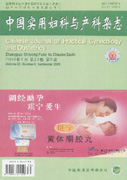Abstract: The pathogenic microorganisms of perinatal infection include bacteria,viruses,protozoa,etc.It increases the risk of perinatal brain injury which is even more serious than hypoxia ischemic injury ,when fatal immature brain is exposed to intrauterine infection/inflammation.The bad neurodevelopmental outcomes not only include cognitive disorders,epilepsy,cerebral palsy,but also increase the risk of children suffuring autism and schizophrenia.Here we have a overview of perinatal infection and emphase on the near-and long- term influence of perinatal infection on the children’s central nervous system.

